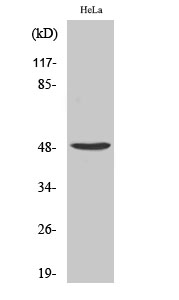PRIM1 Polyclonal Antibody
- 产品详情
- 实验流程
- 背景知识
Application
| WB, IHC-P, IF, ICC, E |
|---|---|
| Primary Accession | P49642 |
| Reactivity | Human, Mouse, Rat |
| Host | Rabbit |
| Clonality | Polyclonal |
| Calculated MW | 49902 Da |
| Gene ID | 5557 |
|---|---|
| Other Names | PRIM1; DNA primase small subunit; DNA primase 49 kDa subunit; p49 |
| Dilution | WB~~Western Blot: 1/500 - 1/2000. Immunohistochemistry: 1/100 - 1/300. ELISA: 1/10000. Not yet tested in other applications. IHC-P~~1:50~200 IF~~1:50~200 ICC~~N/A E~~N/A |
| Format | Liquid in PBS containing 50% glycerol, 0.5% BSA and 0.09% (W/V) sodium azide. |
| Storage Conditions | -20℃ |
| Name | PRIM1 |
|---|---|
| Function | Catalytic subunit of the DNA primase complex and component of the DNA polymerase alpha complex (also known as the alpha DNA polymerase-primase complex - primosome/replisome) which play an essential role in the initiation of DNA synthesis (PubMed:17893144, PubMed:24043831, PubMed:25550159, PubMed:26975377, PubMed:31479243, PubMed:33060134, PubMed:9268648, PubMed:9705292). During the S phase of the cell cycle, the DNA polymerase alpha complex (composed of a catalytic subunit POLA1, an accessory subunit POLA2 and two primase subunits, the catalytic subunit PRIM1 and the regulatory subunit PRIM2) is recruited to DNA at the replicative forks via direct interactions with MCM10 and WDHD1 (By similarity). The primase subunit of the polymerase alpha complex initiates DNA synthesis by oligomerising short RNA primers on both leading and lagging strands (PubMed:17893144). These primers are initially extended by the polymerase alpha catalytic subunit and subsequently transferred to polymerase delta and polymerase epsilon for processive synthesis on the lagging and leading strand, respectively (By similarity). In the primase complex, both subunits are necessary for the initial di-nucleotide formation, but the extension of the primer depends only on the catalytic subunit (PubMed:17893144). Synthesizes 9-mer RNA primers (also known as the 'unit length' RNA primers). Incorporates only ribonucleotides in the presence of ribo- and deoxy-nucleotide triphosphates (rNTPs, dNTPs) (PubMed:26975377). Requires template thymine or cytidine to start the RNA primer synthesis, with an adenine or guanine at its 5'-end (PubMed:25550159, PubMed:26975377). Binds single stranded DNA (By similarity). |
Research Areas
For Research Use Only. Not For Use In Diagnostic Procedures.
Application Protocols
Provided below are standard protocols that you may find useful for product applications.
BACKGROUND
DNA primase is the polymerase that synthesizes small RNA primers for the Okazaki fragments made during discontinuous DNA replication.
终于等到您。ABCEPTA(百远生物)抗体产品。
点击下方“我要评价 ”按钮提交您的反馈信息,您的反馈和评价是我们最宝贵的财富之一,
我们将在1-3个工作日内处理您的反馈信息。
如有疑问,联系:0512-88856768 tech-china@abcepta.com.
¥ 1,500.00
Cat# AP72041























 癌症的基本特征包括细胞增殖、血管生成、迁移、凋亡逃避机制和细胞永生等。找到癌症发生过程中这些通路的关键标记物和对应的抗体用于检测至关重要。
癌症的基本特征包括细胞增殖、血管生成、迁移、凋亡逃避机制和细胞永生等。找到癌症发生过程中这些通路的关键标记物和对应的抗体用于检测至关重要。 为您推荐一个泛素化位点预测神器——泛素化分析工具,可以为您的蛋白的泛素化位点作出预测和评分。
为您推荐一个泛素化位点预测神器——泛素化分析工具,可以为您的蛋白的泛素化位点作出预测和评分。 细胞自噬受体图形绘图工具为你的蛋白的细胞受体结合位点作出预测和评分,识别结合到自噬通路中的蛋白是非常重要的,便于让我们理解自噬在正常生理、病理过程中的作用,如发育、细胞分化、神经退化性疾病、压力条件下、感染和癌症。
细胞自噬受体图形绘图工具为你的蛋白的细胞受体结合位点作出预测和评分,识别结合到自噬通路中的蛋白是非常重要的,便于让我们理解自噬在正常生理、病理过程中的作用,如发育、细胞分化、神经退化性疾病、压力条件下、感染和癌症。






